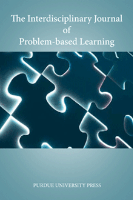
Interdisciplinary Journal of Problem-Based Learning
Scope & Guideline
Transforming Challenges into Learning Opportunities
Introduction
Aims and Scopes
- Problem-Based Learning Methodologies:
The journal extensively covers various methodologies and frameworks used in problem-based learning, emphasizing empirical research and theoretical advancements. - Project-Based Learning Applications:
It explores project-based learning applications across different educational contexts, highlighting case studies and practical implementations that enhance student engagement and learning outcomes. - Educational Technology in PBL:
The integration of digital tools and technologies in problem-based and project-based learning is a core focus, analyzing how these tools can enhance the learning experience. - Interdisciplinary Collaboration:
The journal promotes research that involves collaboration across disciplines, illustrating how interdisciplinary approaches can enrich problem-based learning experiences. - Assessment and Evaluation in PBL:
Research on assessment strategies and evaluation methods for problem-based and project-based learning is a significant area of interest, providing insights into measuring learning outcomes effectively. - Teacher Training and Development:
The journal addresses the professional development of educators in implementing PBL and PjBL, sharing best practices and challenges faced in teacher training.
Trending and Emerging
- Research Methodologies for PBL:
An increasing focus on diverse research methodologies, such as realist reviews and meta-analyses, highlights the importance of robust research designs in studying PBL and PjBL. - Impact of PBL on Critical Thinking Skills:
There is a growing interest in examining how problem-based learning influences critical thinking and communication skills among students, especially in professional education contexts. - Use of Technology in PBL:
The integration of technology, including augmented reality and digital tools, is becoming a prominent theme, with research exploring how these innovations can enhance PBL experiences. - Interprofessional Education:
Research exploring interprofessional problem-based learning is on the rise, reflecting the need for collaborative skills in health and other professional fields. - Civic Engagement through PBL:
Emerging themes include the use of project-based learning to foster civic engagement and social responsibility among students, indicating a broader societal relevance of PBL.
Declining or Waning
- Traditional Learning Models:
There has been a noticeable decrease in research focusing on traditional instructional models, as the emphasis shifts towards more innovative and student-centered approaches like PBL. - Basic Theoretical Frameworks:
Research that merely reiterates basic theoretical frameworks of PBL without new insights or applications has become less prominent, as the community seeks more applied and context-specific studies. - General Education Contexts:
Papers that discuss PBL in general education settings without specific applications or innovative approaches are appearing less frequently, indicating a move towards more specialized and contextual research.
Similar Journals

BMC Medical Education
Empowering educators to shape the future of healthcare.BMC Medical Education is a prestigious journal published by BMC, focusing on the intricate interplay between medicine and education. Established in 2001 and based in the United Kingdom, this open access journal aims to enhance the understanding and practice of medical education across the globe. With its impact factor and strong rankings, including a Q1 classification in both Education and Medicine (miscellaneous) categories, it is recognized as a leading platform for innovative research, education strategies, and best practices in medical training. BMC Medical Education is indexed in Scopus, holding an impressive rank of #104 in General Medicine and #279 in Social Sciences - Education, underscoring its significance in the academic community. Researchers, educators, and students in medical and educational fields will find invaluable resources and insights that contribute to the ongoing development of effective medical training programs. Access to this extensive body of work is freely available, fostering a collaborative environment for advancing education in healthcare.

MEDICAL TEACHER
Connecting research and practice in medical training.MEDICAL TEACHER, published by Taylor & Francis Ltd, is an esteemed journal in the fields of Education and Medicine, recognized for its pivotal role in advancing medical education. With an impressive impact factor, this journal has consistently secured a top-tier position, being classified in Q1 for both Education and Miscellaneous Medicine as of 2023. Established in 1979, it offers a platform for innovative research, critical reviews, and insightful discussions that inform and influence pedagogical practices in medical training globally. Researchers and professionals can benefit from the journal’s comprehensive coverage, which includes empirical research, theoretical discussions, and educational strategies aimed at improving the quality of medical education. As a renowned resource for educators, clinicians, and policymakers, MEDICAL TEACHER continues to shape the future of healthcare education, making it an essential reading for anyone involved in the medical training landscape.

Ensayos-Revista de la Facultad de Educacion de Albacete
Advancing educational excellence through open discourse.Ensayos-Revista de la Facultad de Educacion de Albacete is a distinguished open-access journal dedicated to the field of education, published by UNIV CASTILLA-LA MANCHA, ESCUELA MAGISTERIO ALBACETE. Since its inception in 2011, the journal has provided a platform for high-quality research and innovative pedagogical practices, fostering academic discourse and collaboration among educators, researchers, and practitioners in the education sector. With an ISSN of 0214-4824 and E-ISSN 2171-9098, it is committed to disseminating knowledge that enhances educational outcomes and promotes effective teaching methodologies. The journal is located in Albacete, Spain, and emphasizes the importance of educational research in shaping contemporary educational frameworks. By ensuring open access to its content, Ensayos makes its research widely available, allowing for greater impact and engagement within the academic community. This commitment to accessibility positions the journal as a valuable resource for anyone invested in the advancement of education.
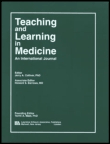
TEACHING AND LEARNING IN MEDICINE
Exploring the nexus of teaching and medicine.TEACHING AND LEARNING IN MEDICINE is a distinguished academic journal, published by Routledge Journals, Taylor & Francis Ltd, focusing on the critical intersection of education and medical training. Since its inception in 1989, this journal has become a vital resource for researchers, practitioners, and educators, showcasing cutting-edge research and innovative practices that enhance pedagogical approaches in medicine. With an impact factor reflective of its high influence in the field, it has earned a notable Q1 ranking in both the Education and Miscellaneous Medicine categories for 2023. Additionally, its impressive Scopus rankings highlight its significance within the medical and educational research communities. Although not an open access journal, TEACHING AND LEARNING IN MEDICINE provides valuable insights that contribute to the advancement of medical education and the improvement of learning outcomes, ensuring that readers stay at the forefront of pedagogical developments. With a commitment to scholarly rigor and practical relevance, this journal is an essential reading for anyone dedicated to elevating educational standards in the healthcare profession.
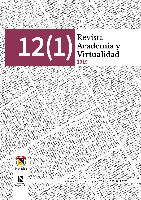
Academia y Virtualidad
Innovating Learning: Bridging Academia and Digital TransformationAcademia y Virtualidad is a distinguished open-access journal published by UNIV MILITAR NUEVA GRANADA that has been disseminating innovative research since 2013. Focused on the intersection of education, technology, and digital transformation, this journal aims to provide a platform for scholars, educators, and practitioners to explore the implications of virtual environments in academic settings. Maintaining a commitment to rigorous peer review and scientific integrity, Academia y Virtualidad plays a vital role in advancing knowledge within the fields of educational technology and digital pedagogy. With its accessible online format and emphasis on contemporary issues, it caters to a global audience eager to engage with the latest trends and research outcomes that shape the future of education. Researchers, professionals, and students alike will find the journal an invaluable resource for staying informed about critical advancements and theoretical discussions in virtual learning and its applications.

Etic net-Revista Cientifica Electronica de Educacion y Comunicacion en la Sociedad del Conocimiento
Fostering Collaborative Research for Global ImpactEtic net-Revista Cientifica Electronica de Educacion y Comunicacion en la Sociedad del Conocimiento, published by UNIV GRANADA, is a pioneering open-access journal dedicated to the exploration and dissemination of research in the fields of education and communication within the context of knowledge society. Since its inception in 2002, this journal has provided a platform for scholars, researchers, and practitioners to share innovative ideas and empirical studies, fostering critical dialogue and collaboration in the rapidly evolving landscape of digital education and communication. With its ISSN 1695-324X, Etic net aims to bridge theoretical frameworks and practical applications, contributing significantly to the scholarly discourse and practices that shape contemporary educational experiences globally. Through its commitment to open access, the journal ensures that high-quality research is freely available to all, promoting inclusivity and accessibility in academic publishing. We invite you to explore the latest findings and contribute to shaping the future of education and communication by engaging with this essential resource.
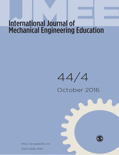
International Journal of Mechanical Engineering Education
Cultivating Knowledge for Engineering ExcellenceThe International Journal of Mechanical Engineering Education, published by SAGE Publications Inc, serves as a premier platform dedicated to advancing the field of engineering education, with a specific focus on mechanical engineering. With a history dating back to 1981, this journal has established itself as a vital resource for researchers, educators, and industry professionals alike, offering insights and scholarly articles that foster innovation and improve pedagogical approaches within the discipline. The journal is currently indexed in Scopus, ranking #542 in Education and #311 in Mechanical Engineering, reflecting its significant contribution to both academic and engineering communities. Although it does not have open access options, the quality and depth of research disseminated through its pages are undeniable, making it an essential read for anyone involved in engineering education. With a Q3 categorization in both relevant fields as of 2023, the journal continually strives to enhance the learning experience and methodologies in mechanical engineering education, paving the way for a future generation of skilled engineers.
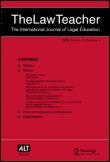
Law Teacher
Fostering Excellence in Legal Scholarship and EducationLaw Teacher is a premier academic journal dedicated to the field of legal education, published by Routledge Journals, Taylor & Francis Ltd. With an ISSN of 0306-9400 and an E-ISSN of 1943-0353, the journal has been a leading platform since its inception in 1967, exploring innovative approaches and pedagogical strategies in law teaching. Recognized for its impact, it currently holds a Q3 ranking in Law and Q4 in Education as of 2023, reflecting its significance within these fields. The journal not only serves as a repository for cutting-edge research but also engages educators, researchers, and practitioners, fostering dialogue and collaboration among stakeholders in legal education. Operating from the United Kingdom, Law Teacher is committed to enhancing the quality of legal training and scholarship, ensuring its relevance to contemporary issues in law and legal practice.

Educatio Siglo XXI
Advancing Knowledge in 21st Century EducationEducatio Siglo XXI is a leading open access journal that focuses on innovative research and critical analyses in the field of education. Published by UNIV MURCIA, this scholarly journal has been contributing to the academic community since its establishment, reflecting the evolving dynamics and paradigms of educational theory and practice. With an ISSN of 1699-2105 and an E-ISSN of 1989-466X, the journal prioritizes accessibility and collaboration among researchers, educators, and policymakers. Its commitment to open access, initiated in 2007, allows for a broader dissemination of knowledge and ideas, making it an invaluable resource for those engaged in educational research. Although detailed metrics such as H-index and Scopus rankings are currently unavailable, Educatio Siglo XXI holds a respectable position within the academic landscape, drawing contributions from various international scholars and providing a platform for interdisciplinary dialogue in education. Whether you are a researcher, professional, or student, this journal will enhance your understanding of contemporary educational challenges and foster innovative solutions.

Pegem Egitim ve Ogretim Dergisi
Shaping the Future of Teaching and LearningPegem Egitim ve Ogretim Dergisi is a prominent academic journal published by PEGEM AKAD YAYINCILIK EGITIM DANISMANLIK HIZMETLERI TIC LTD STI, specializing in the field of education. Based in Turkey, this journal offers a platform for scholarly discourse, catering to both emerging and established researchers in the educational domain. With its ISSN 2148-239X, the journal aims to provide insights into contemporary educational practices, pedagogical innovations, and research findings that influence teaching and learning. Although classified in the Q4 quartile of the education category as of 2022 and achieving a Scopus rank of 1178 out of 1469, it remains a valuable resource for practitioners and academics alike. The journal ceased Scopus coverage in 2023, yet it continues to be a relevant outlet for educational research in Turkey and beyond. While it operates under traditional access models, the potential for collaborative research and knowledge sharing makes it a noteworthy choice for those engaged in the evolving landscape of education.